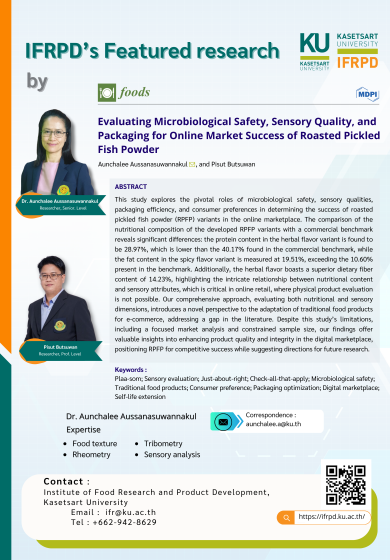Evaluating Microbiological Safety, Sensory Quality, and Packaging for Online Market Success of Roasted Pickled Fish Powder
| ผลงานวิจัย |
ดร.อัญชลี อุษณาสุวรรณกุล และคณะ |
| Keywords |
Plaa-som; Sensory evaluation; Microbiological safety; Traditional food products; Packaging optimization; Digital marketplace; Self-life extension |
| Telephone |
0 2942 8629 (1506) |
| Email |
aucchalee.a@ku.th |
| URL |
https://doi.org/10.3390/foods13060861
|
จุดเด่นผลงาน
บทสรุป : งานวิจัยนี้ศึกษาปัจจัยสู่ความสำเร็จสำหรับน้ำพริกปลาส้มคั่วในตลาดออนไลน์ โดยเน้นที่ความปลอดภัยทางจุลชีววิทยา คุณภาพทางประสาทสัมผัส และทัศนคติของผู้บริโภค การเปลี่ยนไปใช้บรรจุภัณฑ์ที่คงทนขึ้นไม่เพียงแต่ช่วยยืดอายุการเก็บรักษาผลิตภัณฑ์ แต่ยังเหมาะสำหรับการขายออนไลน์โดยการรับประกันความสมบูรณ์ของผลิตภัณฑ์ระหว่างการขนส่ง การวิจัยนี้สนับสนุนการพัฒนาธุรกิจของวิสาหกิจชุมชน โดยเฉพาะการเน้นบทบาทของผู้ประกอบการหญิงในอุตสาหกรรมอาหาร
Abstract : This study explores the pivotal roles of microbiological safety, sensory qualities, packaging efficiency, and consumer preferences in determining the success of roasted pickled fish powder (RPFP) variants in the online marketplace. The comparison of the nutritional composition of the developed RPFP variants with a commercial benchmark reveals significant differences: the protein content in the herbal flavor variant is found to be 28.97%, which is lower than the 40.17% found in the commercial benchmark, while the fat content in the spicy flavor variant is measured at 19.51%, exceeding the 10.60% present in the benchmark. Additionally, the herbal flavor boasts a superior dietary fiber content of 14.23%, highlighting the intricate relationship between nutritional content and sensory attributes, which is critical in online retail, where physical product evaluation is not possible. Our comprehensive approach, evaluating both nutritional and sensory dimensions, introduces a novel perspective to the adaptation of traditional food products for e-commerce, addressing a gap in the literature. Despite this study’s limitations, including a focused market analysis and constrained sample size, our findings offer valuable insights into enhancing product quality and integrity in the digital marketplace, positioning RPFP for competitive success while suggesting directions for future research.
Foods 2024, 13(6), 861




